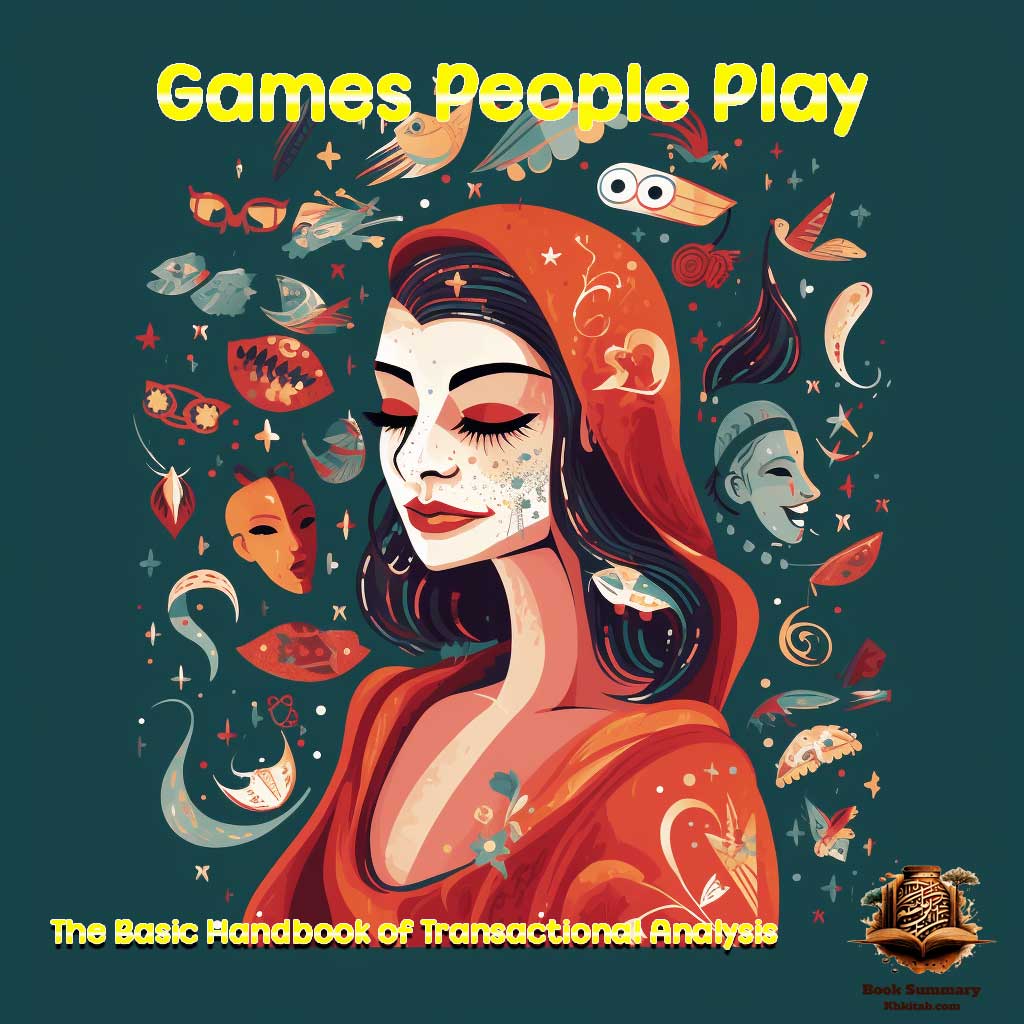Games People Play: The Basic Handbook of Transactional Analysis Book Summary

In the intricate tapestry of human interactions, we often encounter seemingly simple exchanges that, upon closer inspection, reveal intricate and coded behavioral patterns. Dr. Eric Berne, in his seminal work “Games People Play”, takes readers on a profound journey into the psychological “games” we partake in, most of the time unconsciously.
By “games”, Berne isn’t referring to the recreational activities we indulge in for amusement, but rather to those repetitive behavioral patterns that manifest in our daily interactions. These patterns can sometimes lead to conflict, avoidance, or even effective communication. In this context, Berne offers analytical tools that assist in a better understanding of oneself and others, paving the way for more genuine and transparent communication.
The book doesn’t merely provide a theoretical overview of these games but presents readers with a series of real-world examples where they might recognize themselves or those around them. Through these examples and analyses, we learn how to sidestep the pitfalls of these games, or how to respond in ways that fortify relationships rather than erode them.
Table of Contents
What Makes Transactional Analysis a Revolutionary Approach in Understanding Human Interactions?
In the vast domain of psychology, few models stand out as uniquely and practically relevant to everyday life as Dr. Eric Berne’s “Transactional Analysis (TA)”. Featured prominently in his influential book, “Games People Play: The Basic Handbook of Transactional Analysis”, this concept provides a comprehensive framework for deciphering human interactions and the subconscious “games” we often engage in.
Transactional Analysis, at its core, seeks to simplify the complexities of human behavior and communication. It proposes that each individual has three distinct ego states: the Parent, the Adult, and the Child. Each of these states governs how one responds to situations, how one communicates, and the underlying motivations for such responses.
- The Parent ego state is a collection of pre-recorded, taught concepts, which are heavily influenced by parental or authority figures from one’s childhood.
- The Adult ego state represents our ability to think and determine action for ourselves, being more responsive to the realities of the present moment.
- The Child ego state embodies our internal reactions and feelings that emerge directly from childhood experiences.
Understanding these states not only reveals why individuals respond in certain ways but also provides tools to break out of unproductive patterns of behavior. For instance, an overactive Parent state might manifest as excessive criticism, while a dominant Child might reveal itself in bouts of impulsiveness.
Dr. Berne’s book takes readers on an enlightening journey, offering them the tools to navigate relationships more effectively by recognizing which ego state they, or others, are operating from. In doing so, Transactional Analysis paves the way for more genuine, understanding, and constructive human connections. This method’s brilliance lies in its simplicity, making it an accessible and invaluable tool for anyone wishing to deepen their interpersonal insights.
How Do the Three Ego States in “Games People Play” Shape Our Behavior and Communication?
In the realm of understanding human behavior, Dr. Eric Berne’s “Games People Play: The Basic Handbook of Transactional Analysis” stands as a beacon. One of the foundational concepts introduced in the book is that of the “Ego States.” These are three distinct modes of thinking, behaving, and interacting that we oscillate between in our daily lives: the Parent, the Adult, and the Child.
- The Parent Ego State: Stemming from our early years, the Parent represents a collection of beliefs, attitudes, and behaviors we’ve inherited from our primary caregivers and other influential figures. It’s the voice inside us that might say, “Don’t do that; it’s dangerous!” or “Always eat your vegetables.” This state can be nurturing, providing guidelines and safety, but can also be critical or overbearing.
- The Adult Ego State: Often seen as the most rational state, the Adult is our data-processing center. It evaluates, makes decisions, and responds to the present moment based on facts and logic. It’s neither influenced by past traumas nor future aspirations. When someone says, “Let’s look at the facts,” or “What’s the logical solution?”, they are typically operating from the Adult state.
- The Child Ego State: This state encapsulates our emotional side and is rooted in our early childhood experiences. The Child may react with joy, sadness, anger, or any other emotion based on how we felt in similar situations as children. It’s the part of us that seeks pleasure, avoids pain, and desires acknowledgment.
Understanding these states isn’t just about introspection. It plays a pivotal role in our communication with others. For instance, a conversation between two Adult ego states is typically direct and devoid of emotional baggage. However, if one person’s Child state is triggered, the conversation can quickly become emotional or irrational. Recognizing which state we, or our conversational partner, are in allows for more effective communication, reduced misunderstandings, and healthier relationships.
Dr. Berne’s exploration of these ego states in “Games People Play” offers invaluable insights, helping readers identify their predominant states, understand their behavioral sources, and foster more meaningful interactions.
How Do Life Scripts in “Games People Play” Determine Our Adult Choices and Interactions?
Diving deep into the realm of interpersonal relationships, “Games People Play: The Basic Handbook of Transactional Analysis” by Dr. Eric Berne provides readers with a unique perspective on understanding the intricate dance of human connections. One of the standout concepts presented in the book is the idea of “Life Scripts.”
“Life Scripts” can be likened to unconscious roadmaps we develop during our early childhood, based on experiences, interactions, and the feedback we receive. These scripts outline predicted pathways of behavior, relationships, and even the potential outcomes or destinies we might face in our adulthood.
- Formation of Life Scripts: As children, we are incredibly receptive to the world around us. The affirmations or criticisms we receive, the behaviors we observe in our caregivers, and even societal expectations play a massive role in shaping our scripts. For instance, a child constantly praised for being obedient might internalize a script that ties their self-worth to compliance, leading them to constantly seek validation in their adult life.
- Influence on Adult Decision Making: As we mature, these ingrained scripts heavily influence our choices. An individual whose script revolves around being “the protector” based on their childhood role in their family might find themselves always taking on caregiving roles in relationships or choosing professions like counseling or law enforcement.
- Navigating Interactions: Beyond decisions, life scripts shape our interactions. A person with a script that paints them as a perennial “victim” might unconsciously provoke situations where they feel oppressed or wronged, leading to repetitive patterns in relationships.
- Potential for Change: The power of understanding one’s life script lies in the ability to rewrite it. Once we’re aware of these underlying narratives, we have the potential to challenge, alter, or even discard them, forging a path that aligns more closely with our conscious desires and aspirations.
In essence, “Games People Play” shines a light on these deep-seated scripts, urging readers to reflect on their own life narratives and recognize the patterns that might be holding them back. By understanding our scripts, we not only gain clarity about our past but also wield the power to shape our future.
What are the Psychological Games in “Games People Play” and How Do They Shape Our Relationships?
Eric Berne’s groundbreaking work, “Games People Play: The Basic Handbook of Transactional Analysis,” delves deep into the intricate dance of human relationships. One of the central tenets of this book revolves around the concept of ‘psychological games,’ which most individuals unknowingly engage in during their daily interactions.
- Understanding Psychological Games: A psychological game, as defined by Berne, isn’t one of fun or recreation. It’s a series of transactions that are complementary, ulterior, and proceed towards a predictable outcome. These games are mostly habitual, offering both positive and negative payoffs for the participants.
- Notable Examples: Among the plethora of games Berne describes, two stand out prominently.
- “Why Don’t You – Yes But”: This game involves one person presenting a problem, while others offer solutions. The problem presenter then finds reasons to reject each solution, leading to a cycle where no actual solution is ever accepted.
- “Now I’ve Got You, You Son of a Bitch”: This game often starts with a seemingly innocent transaction, but one party secretly harbors a motive to catch the other in a mistake or inconsistency, resulting in blame or conflict.
- Significance in Relationships: Recognizing these games can be life-altering. Many of us find ourselves trapped in repetitive patterns, wondering why our interactions don’t yield the desired outcomes. By identifying the games, we can break these patterns, fostering more authentic and fulfilling relationships.
- The Underlying Needs: Each game reflects an underlying need, often rooted in childhood experiences or deep-seated fears. For instance, the game player in “Why Don’t You – Yes But” might be seeking validation of their perception of the world as unsolvable, reinforcing a victim identity.
- Moving Beyond the Games: Berne doesn’t merely identify the games; he offers insights into how to transcend them. To cease playing these games, one needs self-awareness and the tools of transactional analysis. By understanding our own motives and those of the people we interact with, we can shift from game-playing to genuine interactions.
In conclusion, “Games People Play” offers a transformative lens to view our interpersonal communications. By identifying and understanding the psychological games we play, we’re given a roadmap to healthier, more genuine relationships.
Our Facebook Page – Book Summary
How Do “Strokes” Shape Human Behavior and Relationships in “Games People Play: The Basic Handbook of Transactional Analysis”?
Eric Berne’s revolutionary work, “Games People Play: The Basic Handbook of Transactional Analysis”, delves deeply into the intricate web of human behavior and interactions. A pivotal concept explored within its pages is that of “strokes.” But what exactly are strokes, and how do they impact our daily relationships?
- Understanding Strokes: In the realm of Transactional Analysis (TA), strokes represent units of recognition or acknowledgment. Every individual, regardless of age, culture, or background, has an inherent need for recognition from others, which Berne refers to as strokes.
- Positive vs. Negative Strokes: Just as we desire praise or compliments (positive strokes), humans can sometimes be drawn to negative attention (negative strokes) if it’s the only form of acknowledgment they receive. A classic example is a child misbehaving to attract the attention of a busy parent. The key insight here is that for many, negative recognition is preferable to no recognition at all.
- Strokes and Psychological Games: Berne asserts that many of the “games” people play in their interpersonal relationships are driven by the quest for strokes. These games, often unconscious, become strategies or mechanisms to gain the acknowledgment they crave, even if it’s in a negative context.
- The Currency of Relationships: Think of strokes as a type of currency in human relationships. People often trade compliments, acknowledgment, or even criticisms in their interactions. Over time, individuals develop specific patterns or games that yield the maximum strokes for them.
- Changing the Game: Awareness is the first step to change. By understanding the games we play for strokes and the inherent need behind them, individuals can start to seek more positive and genuine interactions. For instance, rather than playing a game to get a negative response (negative stroke), one can engage in a meaningful conversation to gain positive acknowledgment.
- The Lifelong Need for Strokes: The importance of strokes doesn’t diminish as we grow older. Adults, like children, seek acknowledgment, whether it’s in personal relationships, workplaces, or social circles. Recognizing this can lead to healthier communication patterns and more fulfilling relationships.
In conclusion, “Games People Play” sheds light on the significant role strokes play in shaping our interactions and behaviors. By understanding the power and impact of this simple concept, one can navigate relationships more consciously, fostering deeper connections and minimizing harmful games. As Berne eloquently puts it, understanding the games we play allows us to play them better — or choose not to play them at all.
How Do Rackets and Stamp Collecting Shape Human Behavior in “Games People Play: The Basic Handbook of Transactional Analysis”?
Eric Berne’s groundbreaking work, “Games People Play: The Basic Handbook of Transactional Analysis”, delves deep into the psychological patterns that govern human interactions. One of the intriguing concepts he introduced is the idea of “rackets” and “stamp collecting.” But what are these, and how do they influence the way we engage with the world and others?
- Understanding Rackets: At the core, a racket is an emotional behavior pattern. Often established in childhood, rackets emerge as individuals find certain emotional responses, even negative ones, rewarding or validating. Over time, these emotions become so familiar that seeking them out feels natural, even if they’re detrimental.
- Stamp Collecting – A Manifestation of Rackets: This metaphorical term refers to the unconscious accumulation of validations for one’s rackets. For instance, someone with a racket around being unlovable might “collect stamps” by seeking out situations where they feel rejected, thus confirming their internal narrative.
- Safety in Familiarity: Odd as it may sound, there is safety in familiarity. Negative feedback or experiences that align with one’s life script, or preconceived narrative about one’s life, can be comforting. It’s a known territory, and humans often gravitate towards what they know, even if it’s harmful.
- The Impact on Relationships: Rackets and stamp collecting can heavily impact interpersonal relationships. By continuously seeking out feedback that aligns with their rackets, individuals can inadvertently push away positive interactions and draw in negative ones. Over time, this can strain relationships and perpetuate cycles of unhealthy behavior.
- Breaking the Cycle: Berne suggests that awareness is the first step towards breaking out of these patterns. Recognizing one’s rackets and understanding the stamps one tends to collect can help in redirecting behavior towards healthier responses and interactions.
In conclusion, “Games People Play: The Basic Handbook of Transactional Analysis” sheds light on the often-unconscious patterns that dictate our emotional responses and behaviors. Rackets and stamp collecting, though seemingly bizarre terms, offer profound insights into why we sometimes act against our best interests. By understanding these patterns, one can move towards more authentic and healthy interactions in their personal and social lives.
How Can We Navigate Beyond the Games for Genuine Interactions as Illustrated in “Games People Play: The Basic Handbook of Transactional Analysis”?
Dr. Eric Berne’s seminal book “Games People Play: The Basic Handbook of Transactional Analysis” is not just a documentation of the psychological games individuals engage in but also serves as a guide to transcend these games and foster genuine, game-free interactions. Let’s delve into the tools and insights Berne presents for genuine human connections:
- Awareness and Recognition: One cannot alter what one doesn’t recognize. Identifying the games we play is the foundational step. Berne’s detailed breakdown of common games, from “Now I’ve Got You, You Son of a Bitch” to “Why Don’t You – Yes But,” equips readers with the understanding to spot when they’re falling into these transactional traps.
- Transactional Analysis: This is the heart of Berne’s approach. By analyzing transactions or interactions between individuals, one can discern which ‘ego state’ (Parent, Adult, Child) is active, helping individuals step out of unhealthy patterns and into the ‘Adult’ state where rational, game-free transactions occur.
- Decommissioning Scripts: Childhood scripts often determine the games played in adulthood. By identifying, challenging, and rewriting these scripts, one can effectively reduce the number of games they play. This process helps in liberating oneself from past programming.
- Seeking Authenticity: Beyond just recognizing games, Berne stresses the importance of authenticity. This involves nurturing genuine feelings and communicating them transparently, rather than hiding behind the facades that games often represent.
- Open Communication: Many games arise from unsaid feelings, misconceptions, or suppressed emotions. Adopting a straightforward communication approach, where feelings and concerns are openly discussed, can curtail the inception of many games.
- Professional Guidance: Sometimes, the games ingrained within us can be challenging to navigate alone. Transactional Analysis therapists, following Berne’s methods, can provide invaluable guidance in untangling oneself from these games.
- Continuous Learning and Growth: Just as society evolves, so do the games people play. Being committed to ongoing personal development and being open to learning can help individuals stay updated and ahead of newer, more subtle games that might develop over time.
In conclusion, while “Games People Play” provides a profound insight into the unconscious games individuals partake in, its real value lies in the solutions and tools it offers to foster sincere, game-free relationships. Embracing Berne’s recommendations can pave the way for healthier, more authentic interactions in all areas of life.
Life Sciences & Medicine – Book Summary (khkitab.com)
How Can Transactional Analysis from “Games People Play” Aid in Therapy for Healthier Relationships?
Dr. Eric Berne’s groundbreaking book, “Games People Play: The Basic Handbook of Transactional Analysis,” delves deep into the psychological patterns governing human interactions. One of its most intriguing applications is in the realm of therapy, particularly in aiding individuals in cultivating healthier relationships. Let’s unpack how Transactional Analysis (TA) can be therapeutically instrumental:
- Understanding Ego States: At the heart of TA lies the concept of three ego states – Parent, Adult, and Child. Recognizing which ego state one operates from during interactions can highlight unhelpful patterns and provide clarity on how to navigate conversations more maturely.
- Decoding Games: People often play “games” in their interactions, driven by subconscious motives. By identifying and understanding these games, therapists can help individuals recognize destructive patterns and move towards more genuine interactions.
- Life Position Recognition: TA introduces the concept of life positions, the most fundamental being “I’m OK, You’re OK.” Recognizing and challenging negative life positions can pave the way for healthier self-esteem and better relationships.
- Breaking Away from Rackets: These are sets of behaviors, feelings, and accompanying justifications that we use, sometimes subconsciously, to manipulate our environment. Identifying these allows individuals to replace them with more authentic reactions.
- Re-scripting: Berne emphasizes that we often operate based on scripts written in our childhood. Through therapy, individuals can rewrite these scripts to better suit their present selves, leading to more fulfilling relationships.
- Strengthening Autonomy: The ultimate goal of TA is to achieve autonomy – the ability to be free from old patterns and make new decisions based on the here and now. Therapists use TA to empower individuals to break free from their past games and embrace more genuine connections.
- Real-time Feedback: In therapy sessions, a trained professional can provide instant feedback on the client’s ongoing games, offering a unique opportunity for on-the-spot introspection and growth.
- Role-playing: Using TA concepts, therapists can engage in role-playing exercises with clients, helping them practice new, healthier interaction patterns in a safe environment.
In conclusion, the principles laid out in “Games People Play” not only offer insights into the complex world of interpersonal dynamics but also provide actionable tools. When applied therapeutically, Transactional Analysis can be a powerful ally in helping individuals foster more genuine, healthy, and fulfilling relationships.
Games People Play: The Basic Handbook of Transactional Analysis Book Summary


